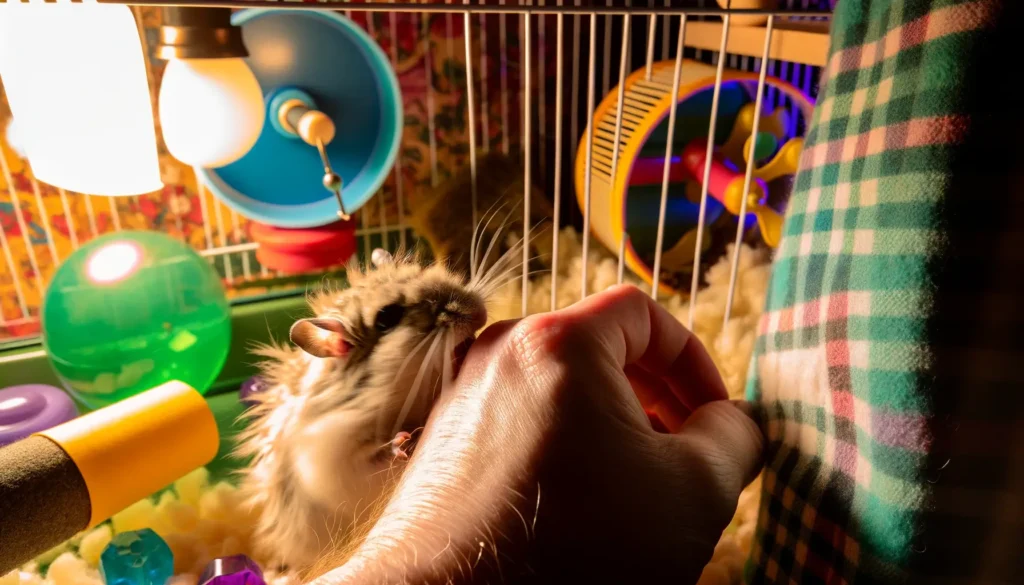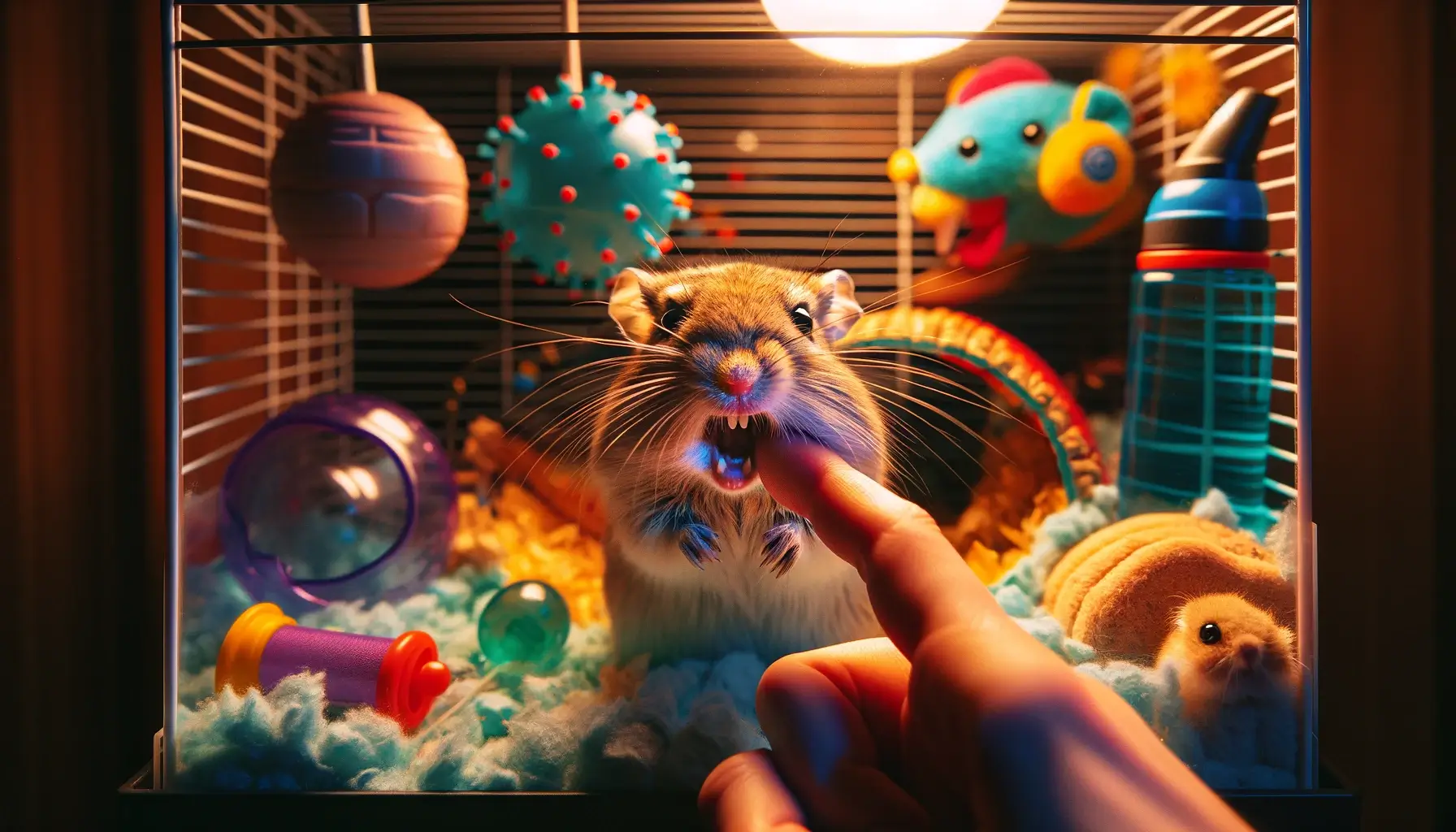Gerbils are adorable, sociable pets that bring joy to many households. However, like any animal, they can sometimes exhibit behaviors that are less than desirable, such as biting.
Understanding and addressing the reasons behind this behavior is crucial for the well-being of both the gerbil and its owner.
This guide aims to provide you with the knowledge and tools to prevent and manage gerbil bites effectively.
Why Do Gerbils Bite?
Gerbils bite for a variety of reasons, primarily revolving around fear and self-defense. In the wild, their sharp teeth are their primary means of protection. If a gerbil feels threatened or scared, it may bite to defend itself.
Additionally, gerbils explore the world with their mouths, and sometimes they might mistake your fingers for food, especially if they smell like treats.
Do Gerbil Bites Hurt?
The severity of a gerbil bite can vary. While some bites are gentle nibbles that barely leave a mark, others can be quite painful and may even draw blood. The intensity of the bite often reflects the gerbil’s level of fear or stress.
It’s important to understand that a gerbil doesn’t bite out of malice but rather out of instinct or misunderstanding.
Are Gerbil Bites Dangerous?
While gerbil bites can hurt, they are rarely dangerous. However, any animal bite has the potential to become infected if not properly cared for. Gerbils’ mouths, like those of all animals, contain bacteria that can lead to infection if introduced into a wound.
Promptly cleaning and disinfecting any bite is crucial to prevent infection. In rare cases, if the bite is particularly deep or becomes infected, medical attention may be necessary.
Preventing Gerbil Bites
Proper Handling Techniques
The key to preventing gerbil bites lies in proper handling. Gerbils are prey animals and can easily feel threatened by larger creatures, including humans. To make your gerbil feel safe:
- Scoop, Don’t Grab: Gently scoop your gerbil up from below rather than grabbing it from above. This method is less likely to startle your pet and mimics a more natural interaction.
- Avoid Sudden Movements: Move slowly and predictably around your gerbil. Sudden movements can trigger a fear response, leading to biting.
Creating a Trusting Environment
Building a relationship of trust with your gerbil is essential for preventing bites. Spend time near your gerbil’s cage every day without attempting to handle it. This presence allows your gerbil to become accustomed to you and understand that you’re not a threat.
Gradually, you can introduce your hand into the cage with treats, allowing your gerbil to approach you on its terms. This slow and steady approach helps build a foundation of trust and reduces the likelihood of biting due to fear or mistrust.
Also read: Why Is My Gerbil Biting the Cage?
Training Your Gerbil Not to Bite: A Step-by-Step Guide

Training a gerbil requires patience, understanding, and a gentle approach. By reinforcing positive behavior and employing corrective measures, you can teach your furry friend to stop biting. Here’s how to foster a biting-free relationship with your gerbil.
Positive Reinforcement: The Key to Gentle Interactions
Positive reinforcement is a powerful technique in animal training, including for your gerbil. This method focuses on rewarding desired behaviors, which encourages the animal to repeat them. Here’s how to apply it:
- Reward Good Behavior: Whenever your gerbil interacts with you gently, offer a small treat or verbal praise. This positive association helps your gerbil understand that gentle behavior is rewarding.
- Use Treats Wisely: Offering treats from your hand can also teach your gerbil that hands are sources of good things, not threats. However, ensure that treats are given sparingly to avoid overfeeding.
Remember, consistency is crucial. Regular, positive interactions build trust and reduce fear, leading to fewer bites.
Corrective Measures: Gentle Deterrence
Even with the best training, gerbils might still bite occasionally. Here’s how to handle such situations:
- Gentle Air Puffs: If your gerbil bites, a gentle puff of air on its face can act as a mild deterrent. Gerbils do not enjoy this sensation, and it can discourage biting behavior. However, be gentle to avoid startling or stressing your gerbil.
- Protective Gloves: Wearing gloves during handling sessions can protect your hands and help you stay calm if a bite occurs. This calmness is crucial, as overreacting can scare your gerbil and potentially increase biting behavior.
Also read: Why Mother Gerbils Eat Their Babies?
When Bites Happen: Immediate and Long-term Strategies
Despite your best efforts, bites can still happen. Here’s how to manage these situations effectively.
Immediate Actions After a Bite
- Clean the Wound: Immediately wash any bite with soap and water to prevent infection. Apply an antiseptic cream and cover with a bandage if necessary.
- Seek Medical Attention: If the bite is deep or signs of infection appear (such as redness, swelling, or pus), consult a healthcare provider.
Long-term Strategies for Bite Prevention
- Reevaluate Your Approach: If bites continue, consider whether your handling techniques or the environment might be causing stress to your gerbil. Adjusting these factors can reduce biting incidents.
- Consult a Veterinarian: Persistent aggression might indicate health issues. A vet can rule out any underlying conditions that could be causing your gerbil discomfort or stress, leading to biting.
Also read: What is Declanning in Gerbils?
FAQs
Why does my gerbil bite me even though it seems happy?
Gerbils use their mouths to explore and may nibble out of curiosity rather than aggression. A happy gerbil might still bite if it smells food on your hands or is in a playful mood.
To minimize this behavior, ensure your hands are clean and free of strong scents before handling. Introduce a signal, like a soft spoken word, to let your gerbil know it’s handling time, helping it differentiate between play and exploration.
Can a gerbil bite make me sick?
While gerbil bites are generally not dangerous, they can introduce bacteria that might lead to infection if the wound is not properly cleaned.
It’s rare for a gerbil bite to cause serious illness, but it’s important to clean any bite thoroughly with soap and water, apply an antiseptic, and monitor for signs of infection such as redness, swelling, or pus.
If any signs of infection appear, consult a healthcare provider promptly to prevent complications.
How can I tell if my gerbil is biting out of fear or aggression?
A gerbil’s body language can provide clues about its feelings. Fearful gerbils may try to escape and hide, biting only if cornered. Aggressive behavior, often stemming from territorial disputes or hormonal changes, might include charging or thumping.
Understanding the context of your interactions can help differentiate between fear and aggression. Providing a calm, stable environment and handling your gerbil gently can reduce both fear and aggression-related biting.
What should I do if my gerbil bites my child?
First, ensure the bite is cleaned properly to prevent infection. Use the incident as a teaching moment to educate your child on the importance of gentle handling and respecting the gerbil’s space.
Supervise future interactions closely until you’re confident your child understands how to interact safely and respectfully with the gerbil.
This approach not only protects your child but also helps prevent stress for your gerbil, reducing the likelihood of future bites.
How long does it take to train a gerbil not to bite?
Training a gerbil not to bite varies with each individual and depends on the consistency of your approach. Some gerbils may respond quickly to gentle, positive reinforcement, while others may take longer to adjust their behavior.
Patience and consistency are key. Regular, positive interactions, combined with understanding and meeting your gerbil’s needs, can significantly reduce biting behavior over time.
Remember, building trust and a positive relationship with your gerbil is a gradual process that requires time and patience.
Conclusion
In conclusion, understanding and preventing gerbil bites is an essential part of responsible pet ownership. By recognizing the reasons behind biting, employing proper handling techniques, and using positive reinforcement, you can foster a trusting and loving relationship with your gerbil.
Remember that patience and consistency are your biggest tools on this path. Every gerbil is unique, and with time and care, you can teach your furry friend to interact gently, ensuring a happy and safe environment for both of you.
Embrace the process, and enjoy the rewarding companionship your gerbil offers.











